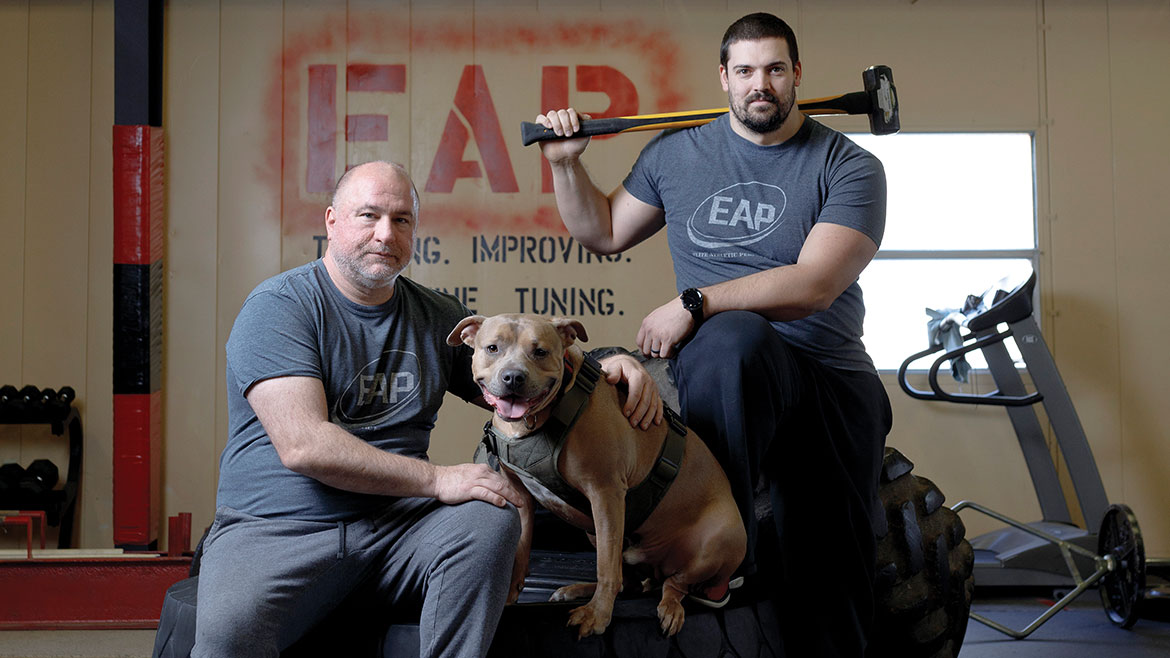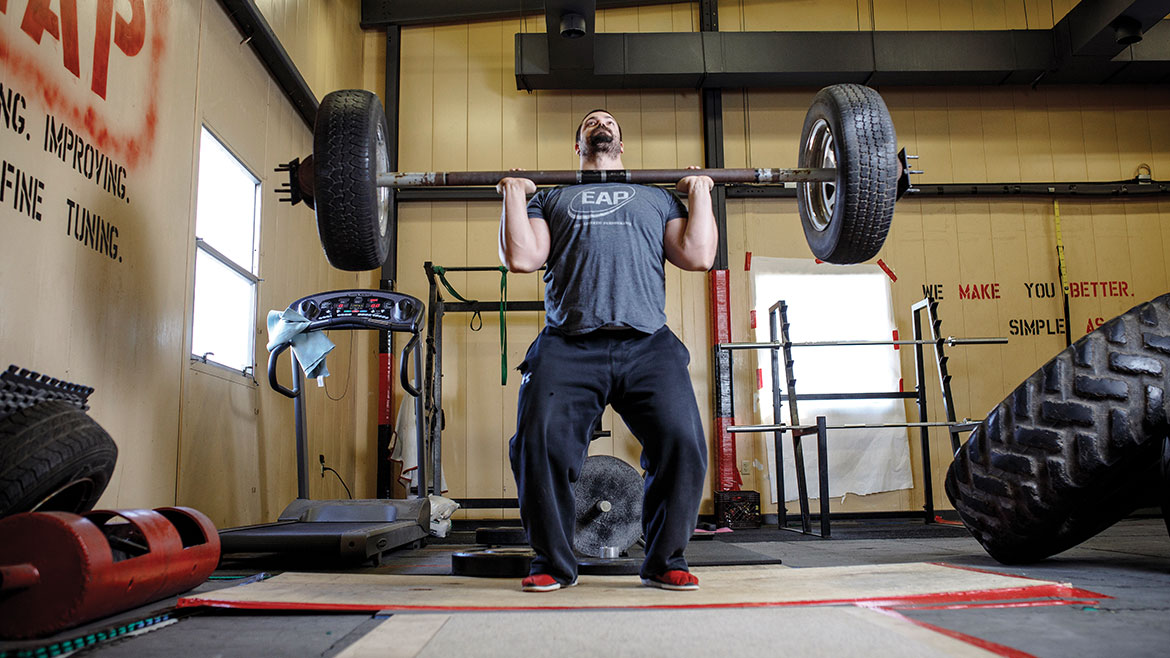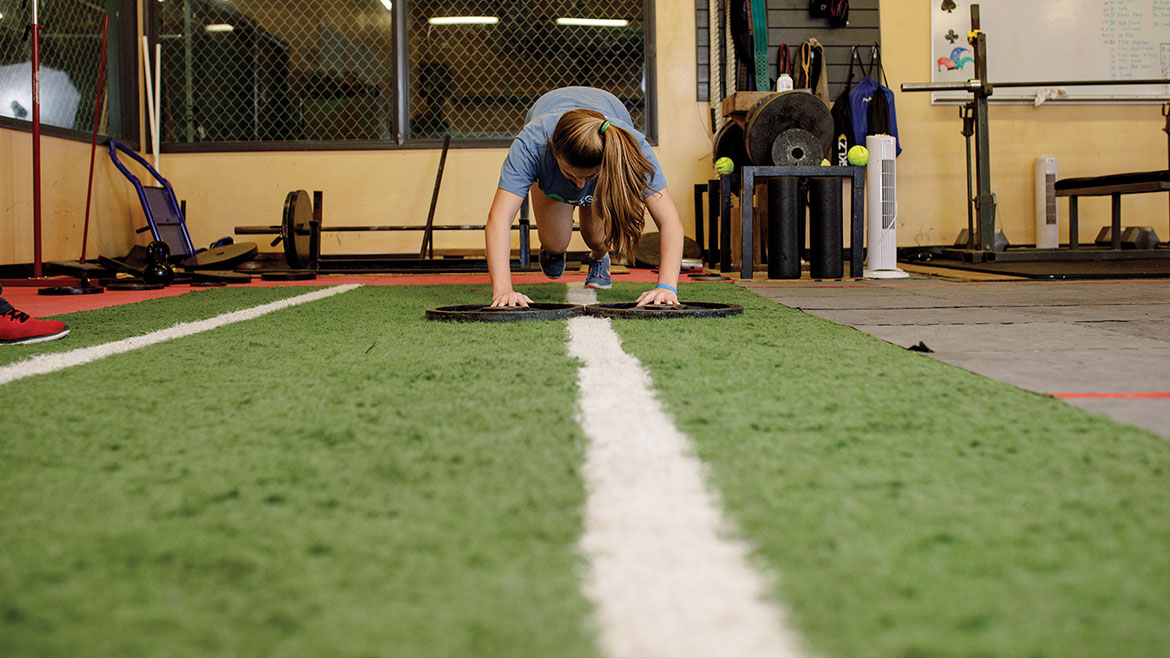Making Gains: Elite Athletic Performance
- photos by Keith Borgmeyer

“There isn’t any place in town that works with kids with autism,” says Jason Morris, co-owner of Elite Athletic Performance.
So, to solve that problem, EAP and the MU Thompson Center for Autism and Neurodevelopmental Disorders have joined forces to give kids with autism an opportunity to work out.
Owners Craig Hindelang and Jason Morris started EAP on May 2, 2015. Morris had been a trainer since 2011, and for a while, he and his wife had been chatting with Hindelang about the prospect of teaming up to start their own gym. After Morris left his freelance training job, he began discussing specifics with Hindelang about what they wanted to create. Soon after, EAP was born.
EAP is a youth sports performance gym for ages 6 to 18. (They also train some college students.) Hindelang and Morris offer both personal and group training. The gym is already used to train Columbia’s rugby teams — the Outlaws and the Black Sheep — as well as professional jiu-jitsu students. Last year, EAP began offering workouts to kids with autism.
“Our goal is to try to help as many different people as we can,” Hindelang says.
Filling in the Gaps
The idea came when Hindelang’s nephew and a young man with autism arrived at EAP one day to inquire about the prospect of starting a specialized workout regimen; the owners involved the Thompson Center to make it happen. While the official program partnering with the Thompson Center has not launched yet, EAP continues to provide workouts to kids with autism in the meantime.
“We like what the Thompson Center offers because they care about everybody,” Hindelang says. “There is an underserviced spectrum that’s out there for all kids or adults with autism, and we would like to see that gap fill in a little bit.”
Kids with autism are especially vulnerable to health issues like obesity and diabetes. By creating a program that can work with kids on all parts of the autism spectrum, EAP can help combat that problem.
Some occupational therapists refer patients to EAP depending on their needs, says Nathan Hurst, strategic communications consultant for the Thompson Center.
“Our therapists recognize a need for a physical fitness program for some of our patients, as well as other children and adults with autism,” Hurst says. “We’re very excited to see how this program develops and look forward to working closely with EAP in the future.”

Technique is the main focus to work on, Morris says. This “technique-based program” can help kids who lack developed motor skills and coordination, which are also affected by autism. They start with the basics: sit-ups, squats, and push-ups.
“When they excel in an area, we include stability using some weight for resistance,” Morris says. “One of the best tools to use is TRX [a suspension-weight training system] because it uses body weight.”
A lot of kids and athletes don’t know what they are able to do until they reach their goal, Hindelang says; EAP’s approach is to make their clients’ objectives attainable.
Mindset is one of the biggest challenges for many athletes. Clients may not trust themselves to go after a certain mark, but after overcoming the “mental games,” as Morris calls them, they are able to succeed.
“All types of kids and every kid at every ability can do it,” Hindelang says. “There’s no ‘can’t.’”
Seeing the Payoff
One of the most gratifying things that Hindelang and Morris have noticed through the program is that the confidence level of the kids with autism increases after working out. One of the first clients they worked with, Jacob, had confidence issues, Hindelang says. “Once he started doing workouts, he tried to get his mom, brother, everyone involved because he was learning things he hadn’t learned before.”
“The biggest thing is not only physical changes, but self-confidence,” Morris reiterates. “Their confidence level goes from being really shy to showing a random person something they can do.”
Hindelang and Morris also recognized that every child and adult is on a different place on the spectrum — and might have a different mood each day, Hindelang says. They learned how to design a workout that benefits each client depending on how the individual is feeling. For one workout, there can be 10 different ways to do it, depending on the person, Hindelang says.

“Remaining active is important for all children, but children with autism often have difficultly taking part in fitness activities with typically developing children,” Hurst says. “So, it’s important to develop programs that fit those children’s needs as well.”
Hindelang and Morris enjoy training because they’re able to see how much people grow. Whether it’s an adult or a child, watching a trainee meet the goal they never thought they would be capable of is gratifying.
“I love seeing our clients overcome adversity and reach a new goal,” Morris says.
New Opportunities
“Family atmosphere.” That is how Hindelang and Morris see EAP. They incorporate a wide range of athletes into their “family” — everyone from hardcore meatheads to very quiet youth athletes.
“The main goal is to get to know them as a person more than anything,” Hindelang says, “because they’ll have a secure mind working with someone they care about.”
Last summer, EAP raised around $3,500 for the Thompson Center through their “Power-up to Awareness to Beat Autism” fundraiser. This annual power-lifting competition encourages all athletes to participate. There was little time to advertise for the first competition, so this year, Hindelang and Morris expect the April 2018 event to make an even bigger splash.
In the future, Hindelang and Morris hope to work with the Thompson Center to conduct research studies for certain age groups about different learning types.
“We believe every kid should have the opportunity to work out and help better themselves,” Hindelang says, “from the athlete who is going to the top to the kid that just wants to gain confidence.”


